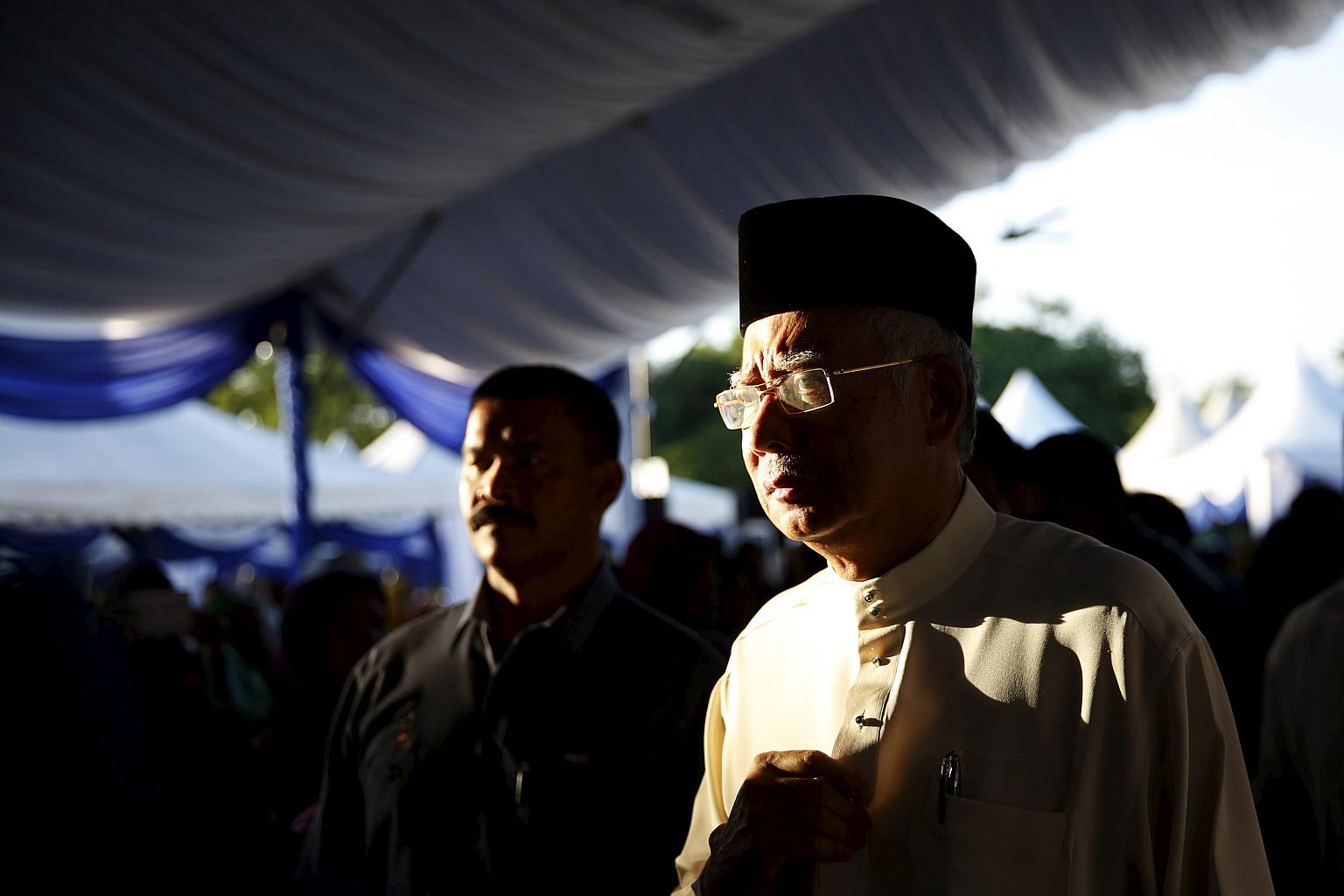Najib's leadership crisis: Possible scenarios
Sign up now: Get insights on the biggest stories in Malaysia

Malaysian PM Najib Razak arriving for a news conference at a mosque outside Kuala Lumpur.
PHOTO: REUTERS
Follow topic:
It has been a rollercoaster ride in the past week for Malaysian Prime Minister Najib Razak.
From the good news on June 30 that Fitch Ratings had maintained Malaysia's credit ranking, signalling the country's finances are improving and growth remaining steady, to the damaging allegations three days later in Wall Street Journal that nearly US$700 million (S$942 million) in state funds were chanelled to his personal bank accounts through proxies linked to state investor 1Malaysia Development Berhad (1MDB).
His deputy Muhyiddin Yassin has described the allegations as "very serious", saying "we want the truth". The opposition has also called for an urgent meeting to discuss Mr Najib's future.
Here's a quick look at three scenarios facing the embattled leader:
1. Prosecution by Attorney-General?
Attorney-General (AG) Abdul Gani Patail is leading a multi-agency taskforce to look into the allegations against Mr Najib. The taskforce consisted of personnel from the Malaysian Anti-Corruption Commission (MACC), the police and the central bank, Bank Negara. They had already raided SRC International Sdn Bhd, Gandingan Mentari Sdn Bhd, and Ihsan Perdana Sdn Bhd on Jul 3 and retrieved documents.
The MACC has pledged to conduct an independent and professional investigation. But considering that it falls under the administrative purview of the Prime Minister's Office, some critics doubt if the probe will go anywhere or if the Najib-appointed AG will actually prosecute if the anti-graft body produces incriminating evidence.
If the AG charges Mr Najib, it would be the first time a Malaysian prime minister is charged and he would be in grave trouble, said Mr Wan Saiful, chief executive officer at think-tank Ideas. "But if he is not (charged), large segments would point to previous occasions when (the Attorney- General's) neutrality was in doubt."
Mr Najib is not the first leader from the ruling Barisan Nasional (BN) coalition to be investigated for transactions involving millions in personal accounts. Previously, Sabah Chief Minister Musa Aman was investigated for funds supposedly channelled via Hong Kong to his accounts elsewhere, but he got off after explaining that the money was Umno's and was part of "political contributions". Former Selangor Menteri Besar Muhammad Muhammad Taib resigned in 1997 after he was arrested in Australia for allegedly bringing in RM3.8 million (S$1.35 million) in undeclared cash. He was subsequently found not guilty.
2. Vote of no confidence?
Two of Malaysia's main opposition parties - the Democratic Action Party (DAP) and Parti Keadilan Rakyat (PKR) - have called for an urgent meeting to discuss Malaysia's future in light of the WSJ article. Even before the allegation surfaced last week, the conservative opposition party Parti Islam SeMalaysia (PAS) had in April proposed a no-confidence motion or a vote of no confidence against Mr Najib over 1MDB's debts and alleged financial mismanagement.
In a vote of no confidence in the Westminster system of government, the Prime Minister is required to retain the confidence of the majority of the Members of Parliament. In Malaysia, it must be at least 112 of the 222 Members of Parliament. Malaysia has not seen any motion of no confidence passed against the Prime Minister
It is easier to pass a vote of no confidence when it is a minority government. But when the government has a clear majority like in Malaysia, the ruling coalition will have to break ranks and work with the opposition for the vote to be passed.
Once a vote of no confidence against the PM is passed, he either resigns or he seeks the consent of His Majesty the Agong to dissolve Parliament and a general election will be held.
But political observers say a vote of no confidence is unlikely to take place as BN leaders will not want to risk losing government. They will simply rally behind another PM candidate, the observers say.
3. Exit from Umno?
At the ruling party's Supreme Council meeting last month, Mr Najib succeeded in delaying party elections by 18 months till mid-2018, giving himself some breathing room to deal with divisions in the party that have opened up after attacks by his well-respected predecessor Dr Mahathir Mohamad.
But given the developments in the past few days, the decision may not help Umno deal with the challenges it faces as an institution from a more discerning public. Some Umno MPs feel that the allegation of state fund transfers to Mr Najib's personal bank accounts presents the party with a real problem as it would then appear that public funds were used to help the BN win the 2013 elections.
It is extremely difficult for the Umno Supreme Council or divisional leaders to muster the numbers to call for an emergency vote against Mr Najib's presidency. The party needs support from two-thirds of the council members to call for one in writing, or more than half of divisions to approve such a motion in extraordinary general meetings (EGMs).
Beyond just rallying the numbers, divisional EGMs are easily challenged in court and in the ensuing legal wrangle, Umno members will start being sacked and suspended, among other things.
No previous leader of the long-ruling party has been removed through a formal vote. But two party leaders were pressured to make "graceful exits" by their colleagues. One of them was Mr Najib's precedessor Abdullah Badawi, who was forced out of Umno after facing the same kind of vitriol from Dr Mahathir. The other was Malaysia's founding father Tunku Abdul Rahman.

